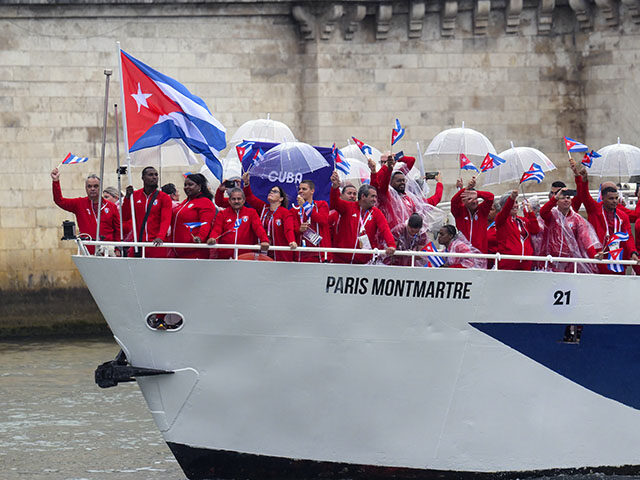Communist Cuba, a regime that has for decades used sports competitions to elevate its geopolitical profile, has faced a series of embarrassments in the first days of the 2024 Paris Summer Olympics – including a high-profile defection before the Games even began and a loss in boxing to a Cuban exile.
Cuba has won 235 Olympic medals in the modern history of the Games, 83 of them gold – an impressive number for an impoverished island nation as a result of longtime communist dictator Fidel Castro, perceiving the propaganda potential of sports, investing heavily in cultivating talent. As the Cuban diaspora has grown, however – largely in part due to a growing number of Cuban athletes using international tournaments to flee communism – the Castro regime has struggled to maintain a stranglehold on its sports messaging and its athletic programs have suffered.
Athletes have increasingly defected as their national achievements have done little to improve their poverty and they struggle with being used for propaganda. In a particularly shameful episode for Cuban athletics in 2021, local Communist Party officials in in Ciego de Ávila celebrated Ronny Álvarez, a gold medalist at the Junior Pan-American Games, by gifting him two bottles of cooking oil, laundry detergent, a handful of yuca, and two packs of hot dogs, among other basic goods.
This year, Cuba is fielding a much smaller team than in previous years, bringing a delegation of 61 people to Paris. That delegation shrunk by one before the Games began when judoka Dayle Ojeda chose not to return to her quarters after a training session the week before the Opening Ceremonies. Ojeda was in Paris to help train other competitors in judo, rather than to compete, and disappeared before her return flight on July 24.
At the Opening Ceremonies, videos went viral of the Cuban delegation scowling on their boats in the Seine, waving their flags lethargically.
“Joy on the boat 21 that will parade along the Seine River,” a video published on the Chinese social medial outlet Tiktok by the account “Cubanos en UK” said in its caption.
@cubanosenuk Alegría en la embarcación 21 que desfilará por el Río Sena. “Me dicen Cuba” en París2024. Nuestra bandera de la estrella solitaria la llevarán Idalys Ortiz y Julio C. La Cruz. #CubaInspira
The delegation of 60 regime-approved Cubans will face at least 21 Cubans competing as part of the delegations of other countries. The U.S.-based Martí Noticias outlet counted 21 Cuban-born athletes at the Olympics not on the Cuban national team, a number that does not include ethnic Cuban athletes born abroad. The United States, in particular, has historically had robust Cuban American participation in the Olympics, this time around including at least two Cuban Americans, judokas Angelica Delgado and María Celia Laborde. Other prominent Cuban Americans competing under the American flag in the past include two-time medalist gymnast Danell Leyva, who is commentating for Telemundo during the Paris Games, and 12-time medalist swimmer Ryan Lochte, who has also announced plans to attend the 2024 Olympics.
Cuban athletes not competing for the glory of the Castro regime have presented significant challenges for the regime in the past, and those challenges began on Sunday during the Paris Games in boxing, one of Cuba’s most popular sports. Loren Berto Alfonso, a Cuban exile fighting for Azerbaijan, defeated Cuban flagbearer Julio César La Cruz, ending La Cruz’s path to a medal in 2024. The independent Cuban outlet 14 y Medio described La Cruz as having “a history of total ideological alignment with the regime,” including condemning the national anti-communist protests on July 11, 2021.
Watch video:
While fleeing his country, Alfonso has also not spoken out against the regime in any way, thanking Cuba for his upbringing while also expressing gratitude to Azerbaijan for giving him the opportunity to compete.
Martí Noticias noted on Sunday that another sport where an outsized Cuban exile presence is expected is the men’s triple jump, where the three athletes expected to medal are all Cuban, but playing for other teams. Top-ranked Jordan Díaz will represent Spain, Pedro Pablo Pichardo will represent Portugal, and Andy Díaz will jump for Italy.
Other prominent Cuban athletes not competing for the Castro regime are Wilfredo León, the star player on the Polish volleyball team; his female counterpart Melissa Vargas, who will compete on the Turkish team; Brazilian Cuban volleyball player Yoandri Leal; and Belgian Cuban fencer Neisser Loyola.
Two other Cuban athletes joined the official Olympics Refugee Team this year, an unprecedented event: canoeist Fernando Dayán Jorge Enríquez and weightlifter Ramiro Mora. The team will include 37 athletes from 11 dictatorships and is intended to “represent more than 100 million forcibly displaced people worldwide,” according to the International Olympic Committee (IOC). The Castro regime immediately protested that the athletes were included as it indicates that Cuba is a repressive dictatorship forcing the mass migration of its citizens, a reality that Havana denies.
“Unfortunately, one of the two athletes included has made disrespectful and fallacious political statements against his country, his people and the sports movement that allowed him to be Olympic champion in Tokyo 2020,” the Cuban Olympic Committee protested, referring to Jorge. The IOC has not taken action to remove the players from the team at press time.

COMMENTS
Please let us know if you're having issues with commenting.